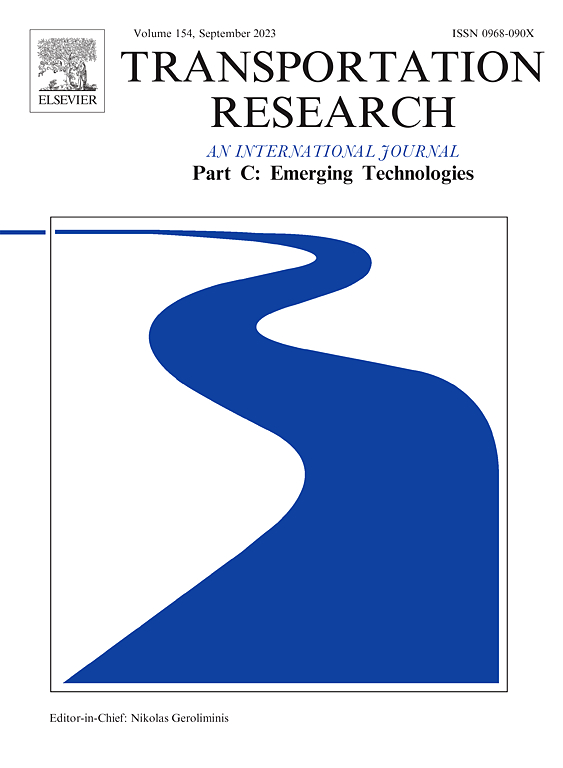The Heterogeneous-Fleet Electric Vehicle Routing Problem with Nonlinear Charging Functions
IF 7.6
1区 工程技术
Q1 TRANSPORTATION SCIENCE & TECHNOLOGY
Transportation Research Part C-Emerging Technologies
Pub Date : 2024-11-22
DOI:10.1016/j.trc.2024.104932
引用次数: 0
Abstract
This paper introduces the Heterogeneous-Fleet Electric Vehicle Routing Problem with Nonlinear Charging Functions (HEVRP-NL). This problem involves routing a heterogeneous fleet of electric vehicles, utilizing multiple charging modes, and accounting for time-dependent waiting time functions at charging stations. The problem is modeled using a path-based mixed-integer linear programming formulation. To solve this problem, we present an algorithmic framework that alternates between two components. The first component is an iterated local search algorithm with a problem-specific route evaluation function, which obtains local optimal solutions and generates a pool of high-quality routes. The second component is a set-partitioning model that combines a subset of routes from the pool, which is constructed based on reduced costs, into a feasible solution. We design HEVRP-NL benchmark instances based on the publicly available electric fleet size and mix vehicle routing problem instances, which are used to evaluate our methods. For small-scale HEVRP-NL instances, the proposed model can be employed in a general-purpose mixed integer programming solver to achieve optimal solutions or find good upper bounds. This exact approach serves as an evaluation of our heuristic algorithm’s ability to attain optimal solutions rapidly. Extensive computational results on large-scale HEVRP-NL instances illustrate the advantages of considering non-linear charging functions and show the impact of waiting time at the charging stations. Finally, we conduct experiments on 120 benchmark instances for the E-VRP-NL and 168 benchmark instances for the E-FSMFTW-PR, which are the special cases of our problem. The results indicate that our algorithm outperforms existing approaches from the literature and identifies 32 new best solutions for the E-VRP-NL and 33 new best solutions for the E-FSMFTW-PR, respectively.
具有非线性充电函数的异构车队电动汽车路由问题
本文介绍了具有非线性充电函数的异构车队电动汽车路由问题(HEVRP-NL)。该问题涉及电动汽车异构车队的路由选择,利用多种充电模式,并考虑充电站随时间变化的等待时间函数。该问题采用基于路径的混合整数线性规划模型。为了解决这个问题,我们提出了一个由两个部分交替组成的算法框架。第一个部分是迭代局部搜索算法,它具有针对特定问题的路径评估功能,可以获得局部最优解,并生成高质量路径库。第二个部分是一个集合划分模型,它将集合中的路线子集(根据降低的成本构建)组合成一个可行的解决方案。我们根据公开的电动车队规模和混合车辆路由问题实例设计了 HEVRP-NL 基准实例,用于评估我们的方法。对于小规模的 HEVRP-NL 实例,建议的模型可用于通用混合整数编程求解器,以实现最优解或找到良好的上限。这种精确的方法可以评估我们的启发式算法快速获得最优解的能力。大规模 HEVRP-NL 实例的大量计算结果说明了考虑非线性充电函数的优势,并显示了充电站等待时间的影响。最后,我们对 E-VRP-NL 的 120 个基准实例和 E-FSMFTW-PR 的 168 个基准实例进行了实验,这些都是我们问题的特例。结果表明,我们的算法优于现有的文献方法,并分别为 E-VRP-NL 和 E-FSMFTW-PR 找出了 32 个新的最佳解决方案和 33 个新的最佳解决方案。
本文章由计算机程序翻译,如有差异,请以英文原文为准。
求助全文
约1分钟内获得全文
求助全文
来源期刊
CiteScore
15.80
自引率
12.00%
发文量
332
审稿时长
64 days
期刊介绍:
Transportation Research: Part C (TR_C) is dedicated to showcasing high-quality, scholarly research that delves into the development, applications, and implications of transportation systems and emerging technologies. Our focus lies not solely on individual technologies, but rather on their broader implications for the planning, design, operation, control, maintenance, and rehabilitation of transportation systems, services, and components. In essence, the intellectual core of the journal revolves around the transportation aspect rather than the technology itself. We actively encourage the integration of quantitative methods from diverse fields such as operations research, control systems, complex networks, computer science, and artificial intelligence. Join us in exploring the intersection of transportation systems and emerging technologies to drive innovation and progress in the field.

 求助内容:
求助内容: 应助结果提醒方式:
应助结果提醒方式:


